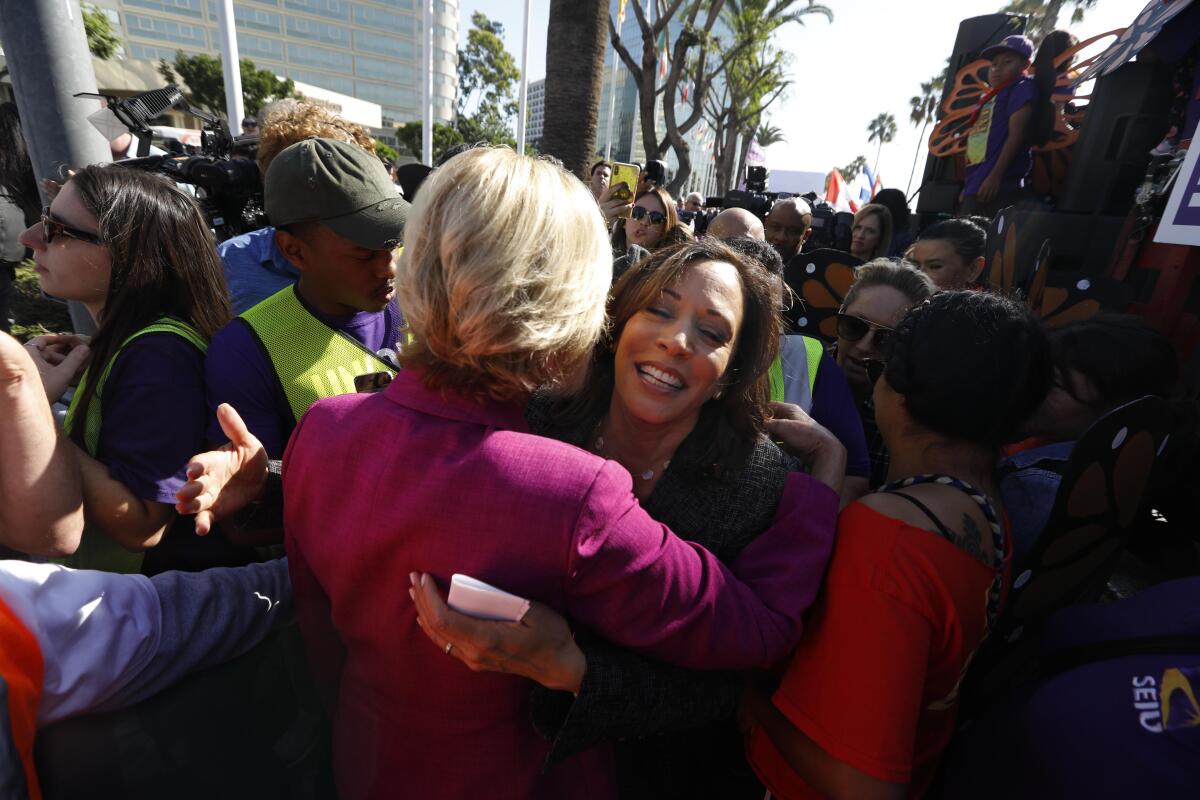Looks like Kamala Harris isn’t a shoo-in to win California’s primary after all

- Share via
SACRAMENTO — OK, I admit it: A column I wrote three months ago was a real loser. That’s because I predicted California Sen. Kamala Harris would be a big winner in her own state’s presidential primary.
But two statewide polls show her falling far behind in the Democratic field, running a distant fourth and trailing Massachusetts Sen. Elizabeth Warren, former Vice President Joe Biden and Vermont Sen. Bernie Sanders.
That’s in a California primary she should own. National polls and surveys in other states are showing similar weak numbers for California’s junior senator.
A new statewide poll of likely voters released Wednesday night by the Public Policy Institute of California shows a virtual three-way tie for the lead in the March 3 primary. Warren is at 23%, Biden at 22% and Sanders 21%. Harris trails way back with 8%, just ahead of South Bend, Ind., Mayor Pete Buttigieg, 6%.
For Harris, that’s a significant drop from a PPIC poll in July that had her at 19%.
A different poll by the UC Berkeley Institute of Governmental Studies released last week showed Warren surging into the lead with 29%, followed by Biden, 20%, and Sanders, 19%. Again, Harris had only 8% and Buttigieg 6%. For Harris, it was a five point drop from an IGS poll in June.
The California primary is still five months away. Before then, there’ll be a few televised debates and four high-profile early state contests — in Iowa, New Hampshire, Nevada and South Carolina — that will influence voters here. The PPIC poll found that 53% of voters who currently support a candidate would be willing to back someone else.
“The California primary is very much up for grabs — up for grabs for Warren, Biden and Sanders,” says PPIC President and pollster Mark Baldassare.
Not Harris?
“Not now. Things could change.”
“Look at her approval ratings,” Baldassare says. “It’s not as if she’s starting out in a very strong position.”
In the PPIC poll, 64% of Democrats approve of how Harris is handling her job as senator and 20% disapprove. That’s good. But among independents, who can vote in California Democratic primaries, she has only 32% approval against 47% disapproval. Overall, counting Republicans, her approval-disapproval numbers are slightly negative at 43%-46%.
Baldassare says of Harris: “Seems to me she’s been talking more about what she’s going to do as a candidate in Iowa than what she’s going to be doing as a senator for California.”
Ouch. That’s a hazard of running for president, especially if you start eyeing the White House even before you’re sworn in as a freshman senator, as Harris did.
I’ve been around long enough to know it’s foolish to predict the winner of a contested presidential primary eight months in advance. I did insert some customary wiggle words, such as “probably” and “good guess.” But it was a bad guess. It was soon after the summer solstice and maybe I was staying in the sun too long.
I was dazzled by Harris’ breakthrough performance in the first presidential debate. She attacked Biden on the race issue, tearing into him for his fond remembrance of political dealings with segregationist senators early in his career, and for his opposition to federally ordered busing for school integration. She proudly recalled that as a little girl, she was bused to help integrate a Berkeley elementary school.
In truth, however, mandatory busing for integration was very unpopular in California. In 1979, voters overwhelmingly banned it.
But Harris shined that night in the debate, reviving a campaign that had stagnated after an impressive start when she drew 20,000 people to a kickoff in her hometown, Oakland.
Assuming Harris would produce other highlight moments, which she has not, I erroneously theorized that she’d probably scare off rival candidates from competing in her home state. California offers 21% of the convention delegates needed to win the Democratic presidential nomination, but it requires barrels of money and lots of campaign stumping to run a competitive race here.
There’ll be 14 state contests in all on that Super Tuesday. So the wise strategy would be to avoid California and focus on states where there’s a better chance of success.
Harris was the strong home-state favorite in California.
Forget it. She’s a weak candidate.
Harris’ message has been muddled and her agenda unclear.
That shouldn’t be a surprise given her unremarkable record as state attorney general. She was overly cautious.
A longtime opponent of the death penalty, Harris refused to take stands on two ballot measures that would have abolished capital punishment. They both failed. She also didn’t take positions on ballot measures to expedite the death penalty and reduce prison sentencing. They passed.
Her lame excuse is that it’s the attorney general’s ministerial duty to write the official title and summary for ballot measures. She didn’t want to appear biased. Baloney.
Harris has another opportunity to stand out and revive her campaign at the next debate on Oct. 15. And if the U.S. House impeaches President Trump, she could shine in the Senate trial circus.
Meanwhile, Harris should mark Dec. 26 on her calendar. That’s the last day to drop out of the race in time to remove her name from the California ballot and avoid a possibly embarrassing loss.
But I’m not predicting anything.
More to Read
Sign up for Essential California
The most important California stories and recommendations in your inbox every morning.
You may occasionally receive promotional content from the Los Angeles Times.











